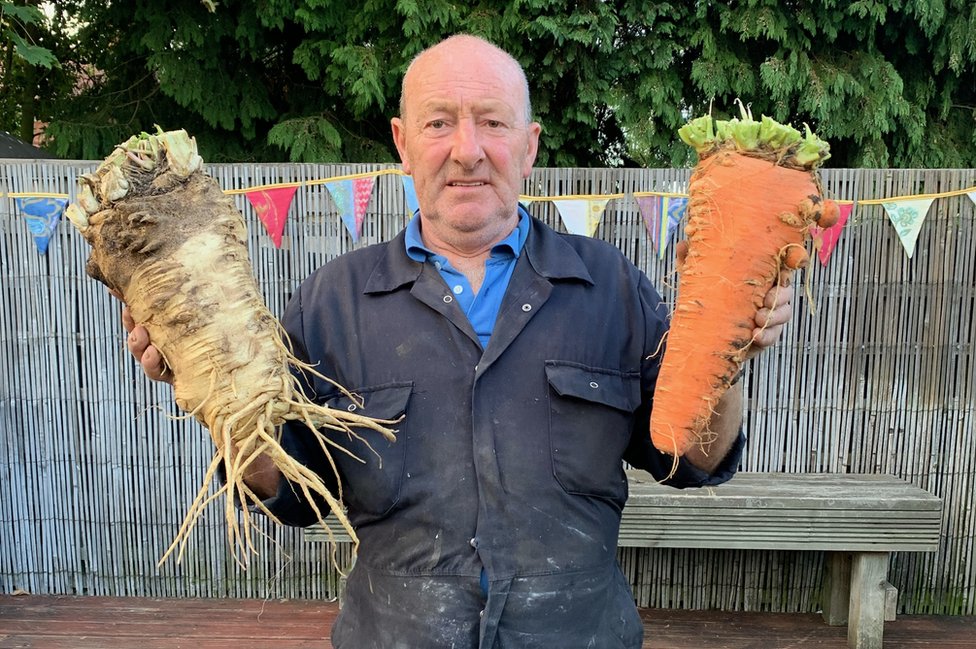With the rising number of coronavirus cases, there was also an upsurge seen in the growth of big vegetables during the worldwide lockdown.
This year empty shelves at the supermarkets have led to a rush on seed supplies as people start planting fruits and vegetables in their homes and backyards. While people were struggling to find food at grocery stores during the pandemic, there were many people who started to feel that growing vegetables at home will be a great idea. In this way, people started to grow their home garden with vegetables and fruits in order to kill their boredom.
People around the world are turning to gardening as a soothing, family-friendly hobby that also eases concerns over food security as the pandemic has slowed down the harvesting and distribution of some crops.
But apart from this tradition of maintaining your own kitchen garden, many people have in the world possesses a passion that involves growing of giant vegetables and presenting them at various competitions. This love for horticulture has led to many giant vegetable competitions that present jaw-dropping vegetables.
This year as the pandemic surges, most horticultural shows got cancelled, leaving growers of supersized vegetables very little opportunity to show off their produce. As the shows were cancelled, the growers of these giant vegetables were unable to showcase their products to the world. But it is important to note that they have still grown them.
Growers have little opportunity to show off their giant vegetables:
While the pandemic might have stopped many from showing their grown vegetables, it did not stop them from growing them.
Canna, a plant nutrient company, took its Giant Vegetable Championships on tour after the Malvern Autumn Show was cancelled, while the National Vegetable Society (NVS) moved some of its competitions online. Growers could enter the competition by photographing their exhibit and submitting it via email.
Holly Bolus, from Canna, said to BBC, “We wanted to make sure that growers still have the chance to showcase their hard work despite all the usual shows being cancelled.”
Each year, giant vegetables competitions used to see a quite unbelievable array of giant fruit and vegetables. There are many vegetable growers who wanted to participate in competitions like this every year. Vegetable growers like Nottinghamshire’s Joe Atherton, who holds five world records took some of his giant vegetables to The Grow Show: On Tour in Mansfield to display them in front of the judges. With this opportunity, he is quite happy as he believes that he can set his sixth world record.
Mr. Atherton, in an interview with BBC said, “it was the only competition he would attend this year due to the pandemic.”
Other than records why do people grow large vegetables?
Many gardeners enjoy the competition of growing the largest vegetables, fruits, and flowers. As these gargantuan veggies don’t happen by accident; they take planning and care. To compete seriously with the seasoned giant vegetable growers, it is important to put considerable effort into the soil, choice of site, and correct gardening technique.
The Giant Vegetable Competition this year held during the pandemic has also witnessed interest from several first-time giant vegetable growers. Dominic Driscoll, from Wingerworth, Derbyshire, grew a 22 Kg cabbage in his allotment during the lockdown. He also said, “I don’t usually do giant vegetables. I do the show vegetables where they look nice, rather than oversized, but I got the seeds and thought I’d give it a go.”
Many people enjoy growing these giant vegetables. They believe that the process of growing vegetables and fruits is full of thrill and excitement. There are also few online giant vegetable groups, who saw this pandemic as a chance for growers from all over the world to connect via social media.
Gardening boom during pandemic:
During this pandemic and quarantine, a large population of the world expanded their gardens. Though food supplies are totally secure, people are finding it productive to grow vegetables at home, in their own gardens. They believe that this growing of vegetables on their own is helping them to connect with nature.
Crisis gardening is not new. Concerns about food security led to the Victory Garden Movement during WWI and WWII; seed retailers and greenhouses also saw sales spikes during the Great Recession.
There’s no better feeling than getting outside in the sun and soil. Gardening is a great form of exercise and it also helps in improving mental health. These are the main reasons people found gardening as an important activity during the worldwide lockdowns.

